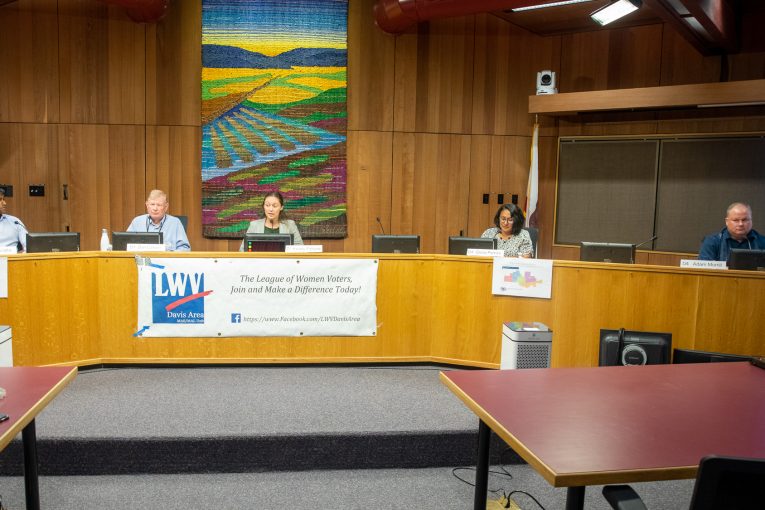
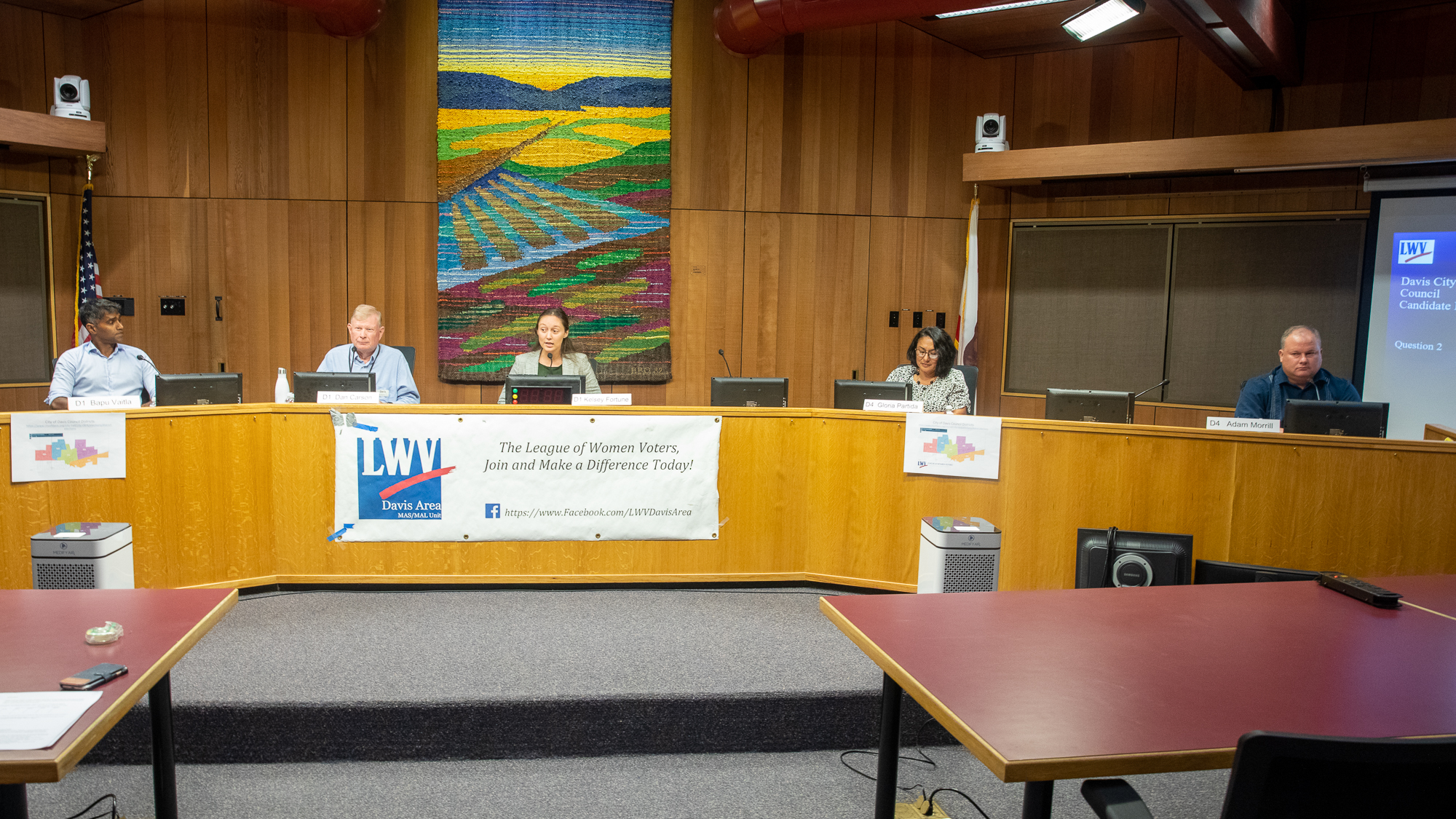
By David M. Greenwald
Executive Editor
On Thursday at the Davis Community Chambers, the League of Women Voters held their candidate’s forum, with Michelle Famula serving as the moderator.
Running for District 1 is incumbent Dan Carson, challenged by Kelsey Fortune and Bapu Vaitla. In District 4, incumbent Gloria Partida is being challenged by Adam Morrill.
There were five league questions, here are questions four and five.
Question: The draft climate action and adaptation plan, which if adopted will affect every Davis resident, presents a comprehensive roadmap to achieve carbon neutrality by 2040. How will you address resident concerns about the potentially high cost of implementation for both the city and individuals?

Adam Morrill: I share the same concerns. We’re in an old 1970s home. Our PG&E is in the ground. We looked into it just recently when we were remodeling, and it would cost us tens of thousands of dollars just to bring in more power to our house. Most people in East Davis, it’s a hundred amp panel. And to do all this electrification would require people to upgrade their panels. And for most people, that’s cost prohibitive. People won’t then sell their homes, they’ll sit on them, they’ll rent them, and we’ll lose more housing stock that way. And then they’ll just let their estates pay for the  upgrades when that time comes. What we need to be focusing on because this climate action plan is basically taken a sledge hammer to a flea. The emissions from our stoves and, and water heaters are dwarfed by the tailpipe emissions. And what we really need to be focusing on with any future development is making sure that they are in reality bike and pedestrian centered so that we can reduce those car trips. In addition to that, what goes along with it is pushing on the university to build workforce housing because there are many people that commute every single day to the university for work. And if we can get those people housed on campus, we can reduce those tailpipe emissions and really go after the big culprit that causes the emissions.
upgrades when that time comes. What we need to be focusing on because this climate action plan is basically taken a sledge hammer to a flea. The emissions from our stoves and, and water heaters are dwarfed by the tailpipe emissions. And what we really need to be focusing on with any future development is making sure that they are in reality bike and pedestrian centered so that we can reduce those car trips. In addition to that, what goes along with it is pushing on the university to build workforce housing because there are many people that commute every single day to the university for work. And if we can get those people housed on campus, we can reduce those tailpipe emissions and really go after the big culprit that causes the emissions.

Bapu Vaitla: With respect to individual costs, there’s been a lot of community concern around the electrification point of sale requirement. For me, what makes more sense is electrification at the end of useful life. So even from an environmental perspective, it doesn’t make sense to trash appliances that are in good working order and have them be in the landfill and impose those transition costs onto individuals. And even when we do this electrification at the end of useful life, low income families, modern income families should be assisted in that transition with tax rebates and subsidies. For the city as a whole, yes, it will require some bold vision and finance upfront financing to fund our climate action and adaptation plan. The good news is that there’s state and federal dollars coming through the pipeline. It takes leadership and strategic vision to say, these are what are going to be our priorities on a strict timetable. We have a lot of great ideas in the CAAP right now, but what doesn’t get prioritized doesn’t get done. I also think that in terms of priorities the next few years, we should be talking about the biggest bang for our buck, which is looking at solar energy generation. And storage is a critical one, especially through microgrids. Also to look at a charging infrastructure for electric vehicles. It’s also public, not just private charging infrastructure in rental properties in business lots and building out a car free downtown. But as I said this, these are all great ideas. Our long term revenue strategy has to be predicated on an economic development identity and strategy. We have that identity around sustainability.
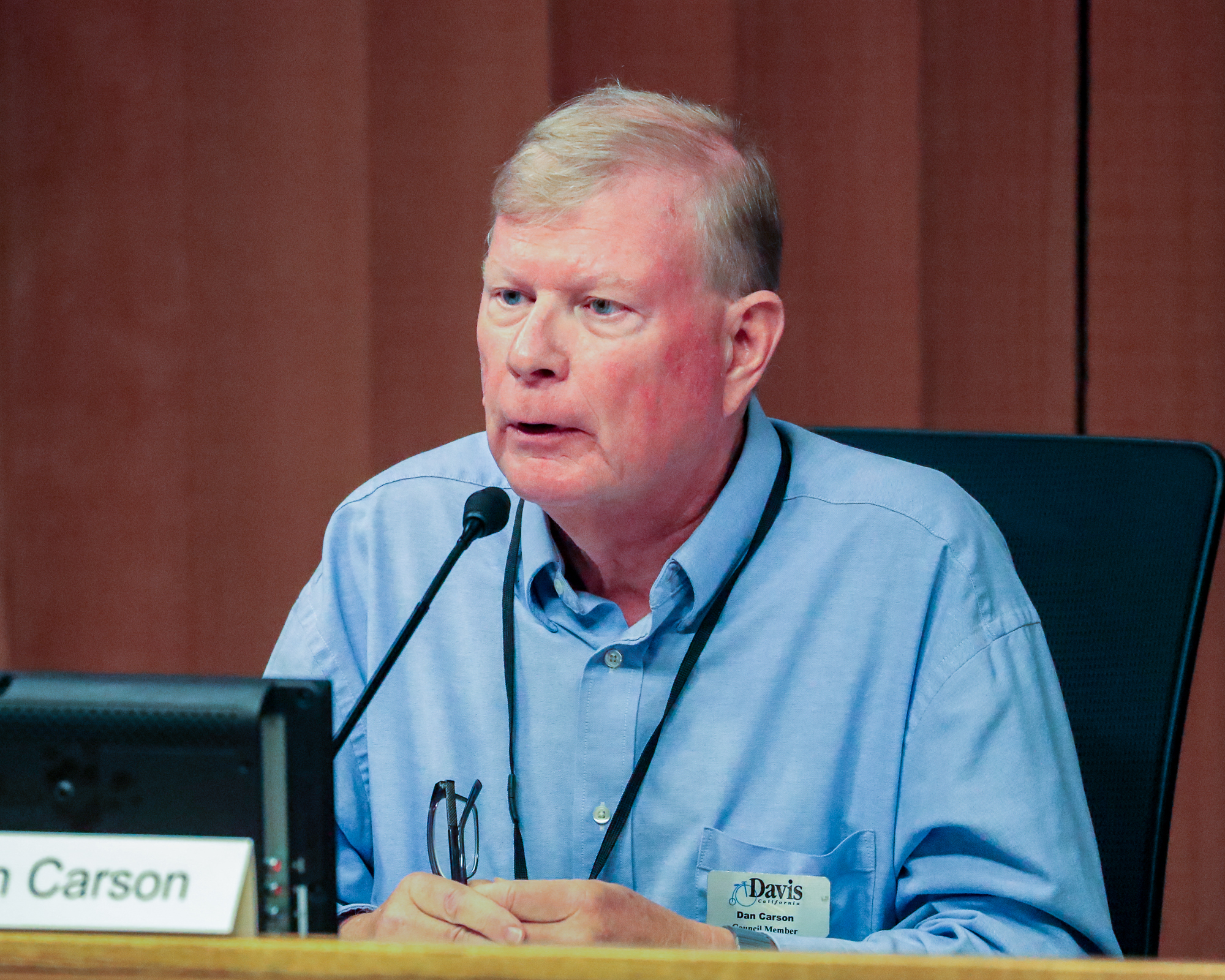
Dan Carson: Our city has been leading on climate change through Valley Clean Energy. We’ve got long term purchase power contracts in place that will bring us to 85% renewable power. In 2024, our city of Davis acted to enact reach codes that will push the limits on heating and cooling and push way ahead on the electrification grid. But there is this proposal for electrification at point of sale. I oppose it. I will not go along with the idea that we’re going to make people rip all their gas fired appliances out of their home at a cost of tens of thousands of dollars, potentially making it impossible for young families to buy homes. What I could see as being possible is that at the end of their useful life, we tell folks, you know, get buying a heat pump that would actually save you money and lower your electricity bill is the way to go. And we can be there with tax credits and the kinds of funds that Bapu accurately referred to in rebates, just the same way I got rebates to, to modernize my gas furnace about eight or nine years ago. We can do it in a way that is voluntary. One of the things that I insisted on in our climate action process as we were writing this plan that it, that our staff score each solution coming before us and give us the overall goal. So we would know if we adopted a plan that would do some good. It turns out not only does it do some good, but we can get there by 2030 overwhelmingly with voluntary actions.

Kelsey Fortune: We are facing a climate emergency. We must move quickly and I could talk about my thoughts and the ideas that I’ve heard from the community about this for hours. But the community is very focused on whole house electrification at the time of sale. And so I want to address that. This specific policy was pointed out by the public now and the NRC months ago as poor policy, as problematic. The council chose to keep it in there anyway. The fact that it made it this far is because of a lack of communication with the community during this process. This 2025 mandate is poor policy because it’s going to decrease the housing stock turnover in our market, which is already very low. It’s going to be extremely costly and it creates an opportunity to spend money enforcing a mandate without actually providing any funds for it. There are simple solutions to this problem, as others have stated, we should be replacing at time of replacement, both for the environment and for our individuals. Creating fee schedules for our gas appliances could easily create funding as well.
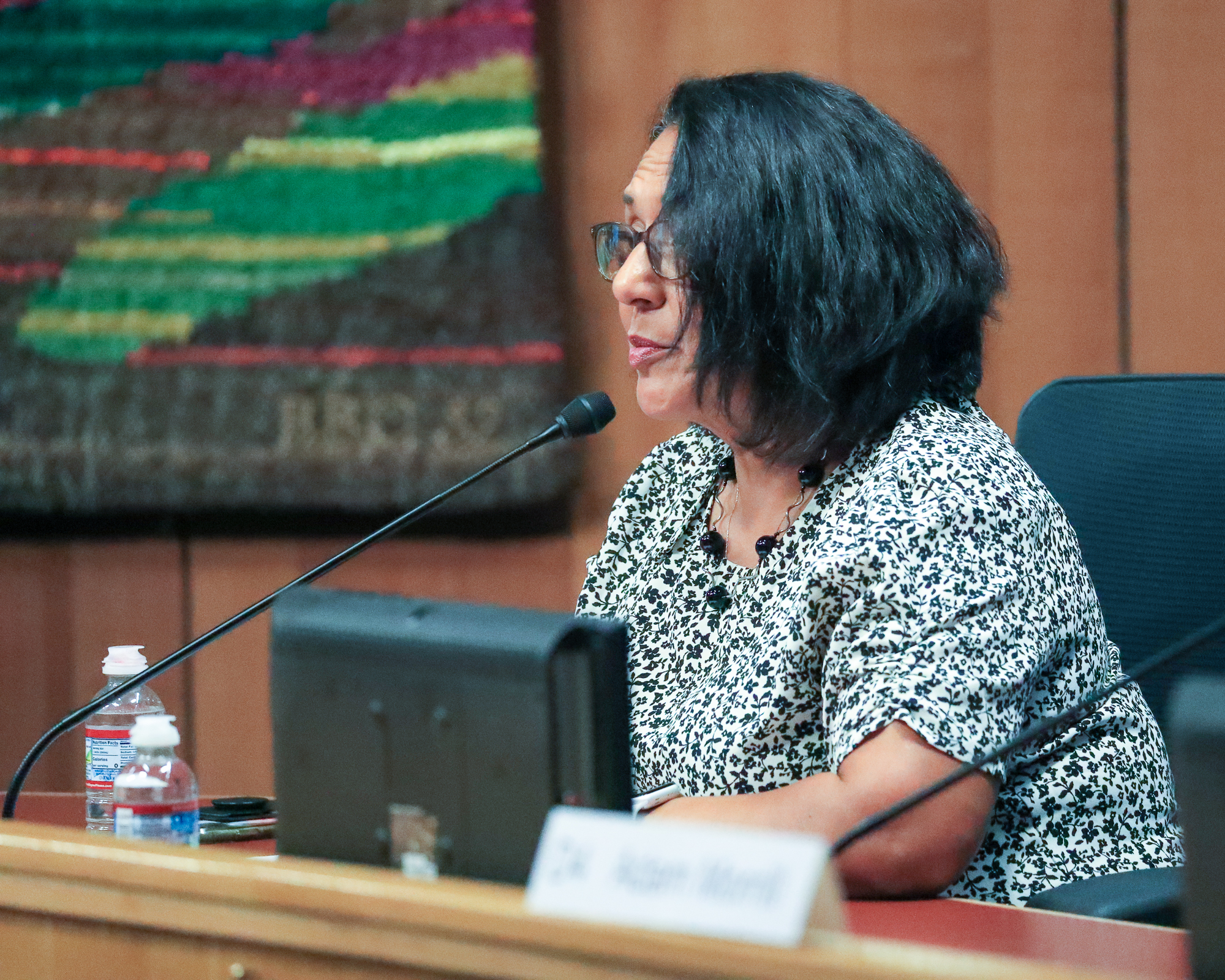
Gloria Partida: Our climate action and adaptation plan, right now, is out for citizen input. And I think that we have all heard loud and clear that electrification at point of sale is something that is not acceptable. And I think I’m on board with everybody else when I say that it makes more sense to, you know, do this at the end of the useful life. As someone that has spent my life advocating for those on the margins who are often the first to get left behind in any crisis, it is important that we don’t burden, that we not burden this crisis on those that can least afford it. And this is why it’s important for me that our climate action plan be extremely thoughtful. And I think that when we put this plan together, that was pretty evident.
We reached out to a number of stakeholders and took in a lot of input. So when this draft came before council we asked for a better understanding of what items would be most cost effective and impactful as Dan mentioned. We did this because we realized that we would have to prioritize and that that was going to be really important for implementation. And finally, I think that the social justice portion of this plan was something of keen interest to me. This meant that, that we really needed to look for ways to make this acceptable for everyone.
Question: Although you will govern all of Davis, you are being elected by voters of a specific district. How will you address the top needs of your district?
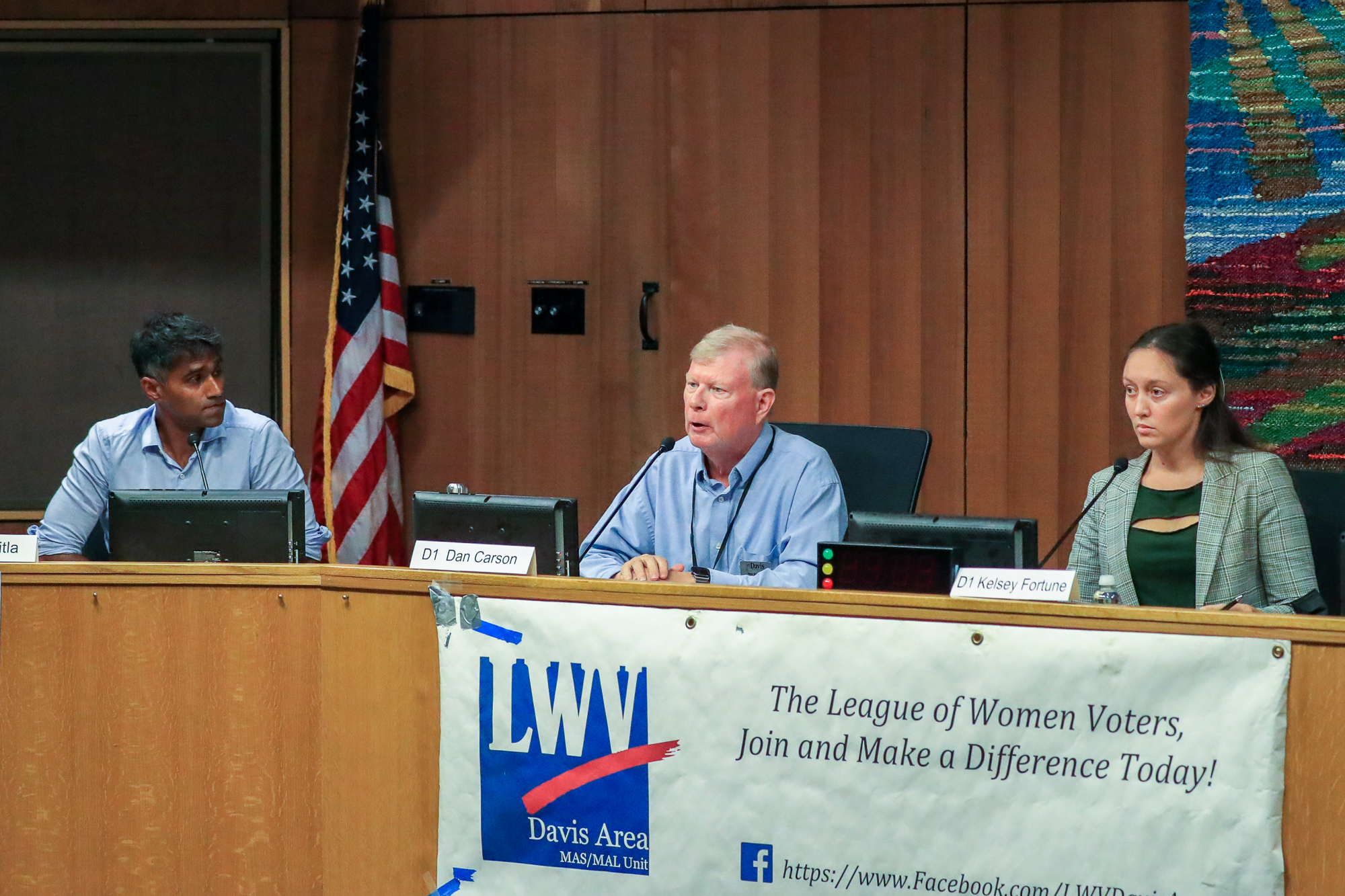
Bapu Vaitla: This I think also speaks to your first question about listening about how we’re going to get information from the community and communicate to the community. And again, the, the campaign has really taught me that there’s no substitute for face-to-face contact. There are a lot of disadvantages to the district system, frankly, but one of them is that your primary responsibility is to your neighborhood around you, to the, to the district, around you. And it’s possible to walk it, it’s possible to hold forums in each of the neighborhoods in the district, issue-based forums as issues come up on infrastructure, on water conservation, on climate, on housing. So this kind of outreach is now part of the game plan, I think for district-based city council members. So doing a whole lot of door knocking, whole lot of arranging forums and doing active outreach to make sure groups that are particularly underrepresented are included. Right now it’s those of us that have time, resources and frankly the confidence to speak in public that are somewhat extroverts are the ones who are able to come to city council meetings, commission meetings, and state their voice state their views. But really there’s a lot of people who are, would like to be engaged, who have great ideas, and it’s on us to go to them instead of forcing them to come to us with their ideas and their views. So that kind of active outreach and out and listening is really important.
Dan Carson: First I’d say we have to strike a balance. I wrote a resolution after we were forced under threat of lawsuit to go to district elections that said we weren’t going to be divided as a city. We’re going to govern as one. And it’s just one example. We say that if somebody in another area reaches out to me for help, I’m not only allowed to help them, I’m obligated to help them. But this, this new approach definitely does mean we’re going to have more focus on neighborhood needs. And I think you’re already seeing results. I landed $250,000 on our city budget to design a roundabout that our reimagined Russell study showed is an extremely dangerous location. I’m going to, once I get that, that drawing, I’m going to have a shovel-ready project that I can shop to a lot of folks at state and federal authorities to go after the act of transportation dollars to build that thing and save lives and protect people, make it more likely that people will bicycle, more likely that they will walk to their destinations. We’re fixing parks, we’re paving streets, and a lot of things are going on in district one, and part of it, I have no doubt is our focus on paying attention to what’s going on in our districts that will be a part of our life going on. And we are hearing from them all the time about what their concerns are. And I am dedicated to meeting those needs.
Kelsey Fortune: Unfortunately, we ended up with districts not through a community process, but through a response by council to threat of a lawsuit. They took that into their hands. And so here we are with districts. To be honest, I don’t think that districts are a good thing for Davis, and I will absolutely be working to change that. We should be electing our council members at large in our community.

Gloria Partida: So this is about communication. This is very similar as Bapu mentioned to the first question. And you have to be, be in, in communication with your district. I’ve lived in my district for 25 years. I’ve unlocked soccer boxes in, you know, Mace Ranch and see a lot of my neighbors when I’m out and about. But I also think that every policy that we act on as a city for the entire city is an opportunity for us to think about our district and think about how that particular policy will affect our particular district. And then advocate for things in that policy that, that will be beneficial for district or to speak up and say, you know, this policy is, is going to maybe be de detrimental to my district. While you don’t want to be parochial or separate yourself out, you also want to govern in a way that is unifying. And so I think, again, it is about communication and making sure that you understand and you listen. I’ve done a number of things for my district even before we were in districts. Rancho Yolo is a senior mobile home park and they needed sidewalks so they could get from their place out to the Unitrans stop. And I made that happen.
Adam Morrill: I know a lot of people didn’t like switching to districts, but there are some benefits to it. It forces our leaders to be more accountable. You have a higher voter or a lower voter to representative ratio, so they’re going to listen a lot better. Maybe if we had them sooner, we wouldn’t have had Measure H show up before the voters twice and be rejected twice and more severely the second time around. It, it just, it, it makes you more accountable to the public because you are part of that same community. And like I said earlier, it’s, it makes it easier to reach more people within the community. Like I said, I’m going to have meet and greets out in the park, show up, bring something to share if you want, but that way you have a better you’re getting the pulse of the community a lot more effectively and you know, what’s interest, what’s important to them. But there are obviously issues that span the entire community. Things like homelessness, affordable housing. So of course we’re still going to be advocating on behalf of everyone for, for solutions that affect or problems that affect everybody in the community.

